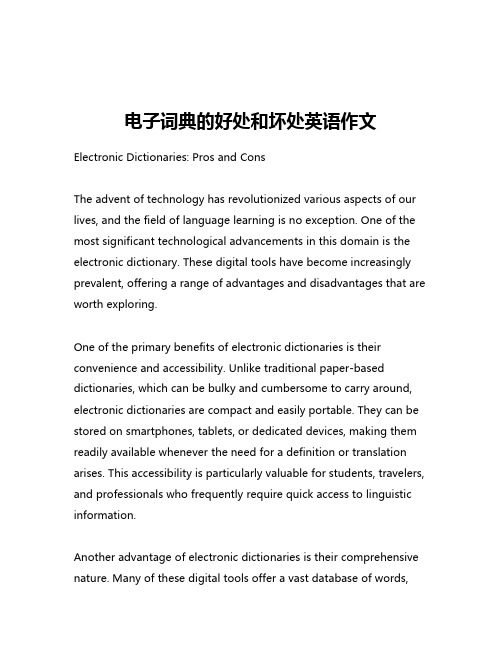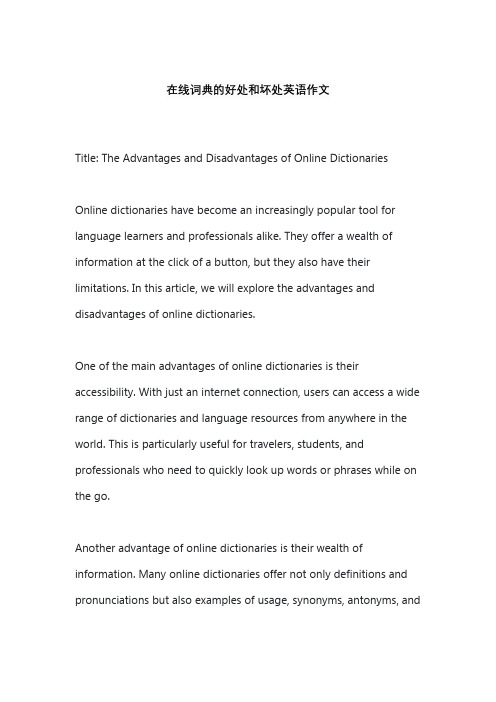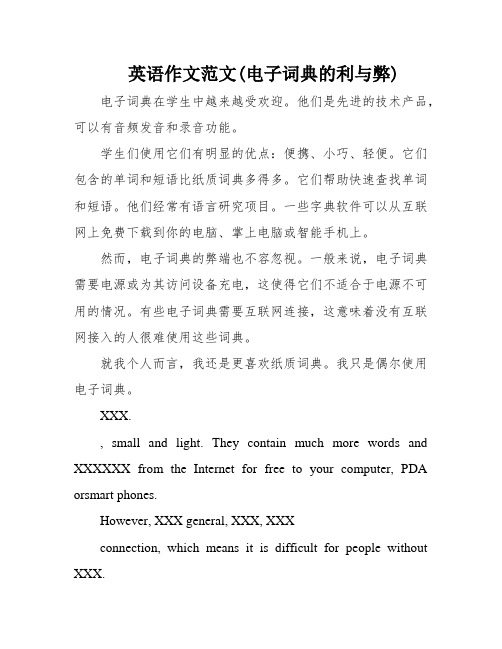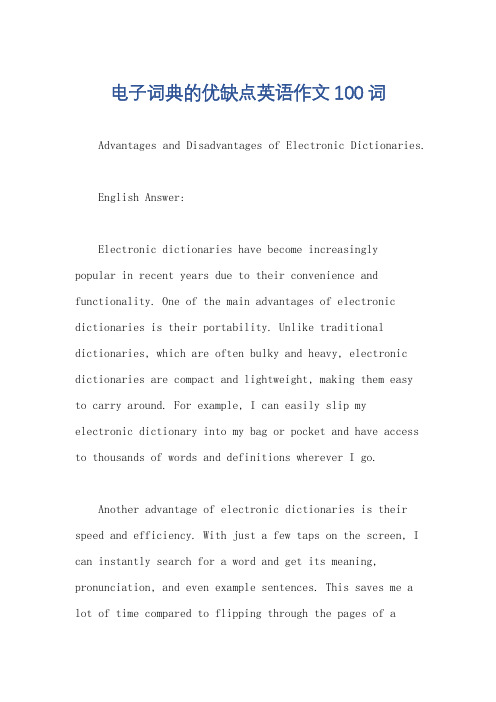英语作文范文(电子词典的利与弊)
电子词典的好处和坏处英语作文

电子词典的好处和坏处英语作文Electronic Dictionaries: Pros and ConsThe advent of technology has revolutionized various aspects of our lives, and the field of language learning is no exception. One of the most significant technological advancements in this domain is the electronic dictionary. These digital tools have become increasingly prevalent, offering a range of advantages and disadvantages that are worth exploring.One of the primary benefits of electronic dictionaries is their convenience and accessibility. Unlike traditional paper-based dictionaries, which can be bulky and cumbersome to carry around, electronic dictionaries are compact and easily portable. They can be stored on smartphones, tablets, or dedicated devices, making them readily available whenever the need for a definition or translation arises. This accessibility is particularly valuable for students, travelers, and professionals who frequently require quick access to linguistic information.Another advantage of electronic dictionaries is their comprehensive nature. Many of these digital tools offer a vast database of words,phrases, and their corresponding definitions, translations, and usage examples. This expansive knowledge base can be particularly helpful for language learners, as it allows them to explore the nuances and contextual applications of words, rather than being limited to a single, static definition. Additionally, electronic dictionaries often provide audio pronunciations, which can be invaluable for improving one's spoken language skills.Furthermore, electronic dictionaries often feature advanced search capabilities that surpass the limitations of traditional paper-based versions. Users can quickly and easily search for words by typing them in, rather than having to manually flip through pages. Some electronic dictionaries even offer features like voice recognition, allowing users to search for words by speaking them aloud. This streamlined search process can save time and enhance the overall user experience.One of the significant benefits of electronic dictionaries is their ability to be regularly updated. Unlike physical dictionaries, which can become outdated over time, electronic versions can be frequently updated with new words, definitions, and linguistic changes. This ensures that users have access to the most current and accurate information, which is particularly important in rapidly evolving languages.However, despite these advantages, electronic dictionaries also come with their own set of drawbacks. One of the primary concerns is the potential for technological failure or malfunction. Unlike a physical dictionary, which can be relied upon even in the absence of electricity or internet connectivity, electronic dictionaries are entirely dependent on their underlying technology. If a device runs out of battery power or experiences a software glitch, users may be left without access to the linguistic resources they require.Another potential downside of electronic dictionaries is the risk of over-reliance. While these tools can be incredibly helpful, over-dependence on them can lead to a decline in the development of essential language skills, such as vocabulary building, spelling, and contextual understanding. Users may become too reliant on the instant gratification provided by electronic dictionaries, neglecting the importance of actively engaging with language through reading, writing, and memorization.Additionally, the use of electronic dictionaries in academic or professional settings can sometimes be perceived as a form of cheating or unfair advantage. In certain examinations or workplace scenarios, the use of electronic dictionaries may be restricted or prohibited, forcing users to rely on their own language proficiency rather than the resources provided by technology.Finally, the cost of electronic dictionaries can be a significant barrier for some users. While the initial investment in a dedicated device or software may be worthwhile for frequent users, the ongoing costs of maintaining and upgrading these tools can be prohibitive for individuals on a tight budget.In conclusion, electronic dictionaries offer a range of benefits, including convenience, accessibility, comprehensive information, and regular updates. However, they also come with their own set of drawbacks, such as technological dependence, the risk of over-reliance, potential restrictions in certain settings, and financial considerations. As with any technological tool, it is important for users to strike a balance and utilize electronic dictionaries judiciously, while also maintaining a strong foundation in language skills through traditional learning methods.。
在线词典的好处和坏处英语作文

在线词典的好处和坏处英语作文Title: The Advantages and Disadvantages of Online DictionariesOnline dictionaries have become an increasingly popular tool for language learners and professionals alike. They offer a wealth of information at the click of a button, but they also have their limitations. In this article, we will explore the advantages and disadvantages of online dictionaries.One of the main advantages of online dictionaries is their accessibility. With just an internet connection, users can access a wide range of dictionaries and language resources from anywhere in the world. This is particularly useful for travelers, students, and professionals who need to quickly look up words or phrases while on the go.Another advantage of online dictionaries is their wealth of information. Many online dictionaries offer not only definitions and pronunciations but also examples of usage, synonyms, antonyms, andrelated words. This makes it easier for users to understand the context and usage of a word and expand their vocabulary.However, online dictionaries also have some limitations. One of the main disadvantages is the potential for accuracy issues. Since online dictionaries are often crowdsourced or rely on automated algorithms, there may be errors or inaccuracies in the definitions or translations provided. Users need to be cautious when using online dictionaries and cross-reference with other sources to ensure accuracy.Another disadvantage of online dictionaries is the potential for distraction. With so much information available at the click of a button, it can be easy to get sidetracked and end up spending hours browsing through different dictionaries or language resources. This can be a productivity killer, especially when users need to quickly look up a word or phrase.In conclusion, online dictionaries offer many advantages, including accessibility and wealth of information. However, they also have some limitations, such as potential accuracy issues and the potential for distraction. Users need to be cautious when using online dictionaries and cross-reference with other sources to ensure accuracy.Additionally, users need to be disciplined and focused when using online dictionaries to avoid getting sidetracked.。
电子词典的优点和缺点专四作文

电子词典的优点和缺点专四作文Electronic dictionaries have become a popular tool for language learners and individuals seeking quick access to definitions, translations, and language resources. They offer several advantages, such as convenience, portability, and a wide range of features. One of the main benefits of electronic dictionaries is their compact size, allowing users to carry them anywhere and access information on the go. They also offer multimedia features, such as audio pronunciation and example sentences, enhancing the learning experience. Additionally, electronic dictionaries often come with built-in search functions, making it easy to find specific words or phrases quickly.However, electronic dictionaries also have some drawbacks. One of the main disadvantages is their dependency on battery power, which can be a limitation when the battery runs out. Additionally, some users may find it challenging to navigate the interface or input text efficiently, leading to delays in accessing information. Furthermore, electronic dictionaries may not always provide accurate or comprehensive definitions, especially for specialized or technical terms.In conclusion, electronic dictionaries offer convenience and a wealth of features for language learners and individuals seeking quick access to language resources. While they have some limitations, such as battery dependency and potential inaccuracies, their benefits often outweigh the drawbacks, making them a valuable tool for enhancing language learning and communication.中文翻译:电子词典已成为语言学习者和需要快速查找定义、翻译和语言资源的个人的热门工具。
必背专四作文:电子词典的优缺点

必背专四作文:电子词典的优缺点必背专四作文:电子词典的优缺点导语:下面是店铺整理的一篇必背的专四作文,不看后悔哦!希望大家喜欢。
专四题目:电子词典Many students today use electronic dictionaries instead of printed dictionaries. Some people say that this is a good thing while others disagree. What is one major advantage or disadvantage of electronic dictionaries?专四范文:One Major Advantage of Electronic DictionariesElectronic dictionaries are becoming more and more popular among students nowadays. As a result, they may eventually render printed dictionaries obsolete! Undeniably electronic dictionaries contain a number of merits in comparison to their printed counterparts and therefore, I would like to suggest one major advantage of electronic dictionaries.Perhaps the most pronounced advantage of electronic dictionaries is that all of them are portable and consequently easy to carry around, whether in a pocket or a bag. Students can put the dictionary in their pocket and look up new words whenever and wherever they are. This is a huge advantage over the traditional large paper bound dictionary because size really does matter. This compactness means not only that electronic dictionaries are getting smaller and lighter as well as incorporating a bigger memory but also that dictionaries can be installed into other small portable devices such as mobile phones. Although smaller in some people's view means less availability of memory and other functions, with the increasing advances madein nanotechnology this is no longer the cases.In the final analysis, electronic dictionaries are the by-product of the inexorable progress of computerization, miniaturization and nanotechnology which has meant that one of their biggest advantages is their small size while still enjoying all the benefits of earlier, larger models. (214 words)更多专四作文精彩句子:1. In many respects, printed dictionaries are inferior to electronic ones. For example...在很多方面,纸质词典不如电子词典。
英语作文范文(电子词典的利与弊)

英语作文范文(电子词典的利与弊)电子词典在学生中越来越受欢迎。
他们是先进的技术产品,可以有音频发音和录音功能。
学生们使用它们有明显的优点:便携、小巧、轻便。
它们包含的单词和短语比纸质词典多得多。
它们帮助快速查找单词和短语。
他们经常有语言研究项目。
一些字典软件可以从互联网上免费下载到你的电脑、掌上电脑或智能手机上。
然而,电子词典的弊端也不容忽视。
一般来说,电子词典需要电源或为其访问设备充电,这使得它们不适合于电源不可用的情况。
有些电子词典需要互联网连接,这意味着没有互联网接入的人很难使用这些词典。
就我个人而言,我还是更喜欢纸质词典。
我只是偶尔使用电子词典。
XXX.
, small and light. They contain much more words and XXXXXX from the Internet for free to your computer, PDA orsmart phones.
However, XXX general, XXX, XXX
connection, which means it is difficult for people without XXX.。
电子词典的优缺点英语作文100词

电子词典的优缺点英语作文100词Advantages and Disadvantages of Electronic Dictionaries.English Answer:Electronic dictionaries have become increasinglypopular in recent years due to their convenience and functionality. One of the main advantages of electronic dictionaries is their portability. Unlike traditional dictionaries, which are often bulky and heavy, electronic dictionaries are compact and lightweight, making them easyto carry around. For example, I can easily slip myelectronic dictionary into my bag or pocket and have access to thousands of words and definitions wherever I go.Another advantage of electronic dictionaries is their speed and efficiency. With just a few taps on the screen, I can instantly search for a word and get its meaning, pronunciation, and even example sentences. This saves me a lot of time compared to flipping through the pages of atraditional dictionary. Moreover, electronic dictionaries often come with additional features such as language translators, grammar guides, and vocabulary quizzes, which further enhance their usefulness.However, electronic dictionaries also have some drawbacks. One of the main disadvantages is their reliance on batteries or charging. If the battery runs out or the device is not charged, the dictionary becomes useless. This can be quite inconvenient, especially when I need to look up a word urgently. Additionally, electronic dictionaries may not provide as much detailed information as traditional dictionaries. While they offer quick and concise definitions, they may lack the in-depth explanations and examples found in printed dictionaries.In conclusion, electronic dictionaries offer portability, speed, and additional features, making them a convenient tool for language learners. However, their reliance on batteries and potential lack of detailed information are some of the drawbacks to consider.中文回答:电子词典近年来因其便捷性和功能性而越来越受欢迎。
英语作文电子词典的主要优点四级作文
英语作文电子词典的主要优点四级作文Title: The Principal Advantages of Electronic Dictionaries Electronic dictionaries have become an indispensable tool for language learners, offering several advantages over traditional paper-based dictionaries. The main benefits of electronic dictionaries can be outlined as follows:Firstly, electronic dictionaries are portable and compact. Unlike their heavy, bulky counterparts, these digital devices can easily fit into a pocket or backpack, allowing users to carry them anywhere. This convenience is particularly beneficial for students who need to look up words while traveling or during classes.Secondly, electronic dictionaries provide instant word definitions and translations. With just a few keystrokes, users can quickly find the meaning of a word, its pronunciation, and even hear it spoken aloud. This immediacy of information not only saves time but also aids in the learning process by providing instant feedback.Thirdly, many electronic dictionaries come with additional features that enhance the learning experience. These may include vocabulary-building games, grammar guides, and language learning programs. Some models also offer theability to store and review personal lists of learned words, enabling users to track their progress effectively.Fourthly, electronic dictionaries often support multiple languages, making them ideal for polyglots or those learning a new language. Switching between languages is usually straightforward, expanding the utility of the device for users who are fluent in more than one language or learning several languages concurrently.Lastly, electronic dictionaries are eco-friendly. They reduce the need for multiple printed dictionaries, thus conserving paper and reducing environmental impact. As technology advances, the durability and longevity of these devices also contribute to minimizing electronic waste.In conclusion, electronic dictionaries offer numerous advantages that make them a superior choice for language learners. Their portability, speed, additional educational features, multilingual support, and environmental friendliness are just some of the key benefits that outweigh traditional dictionary options. As language acquisition becomes increasingly important in global communication, electronic dictionaries stand as a testament to the evolution of educational tools, adapting to the needs of modern learners inan efficient and effective manner.。
电子辞典的优点和缺点英语作文
电子辞典的优点和缺点英语作文English: Electronic dictionaries have both advantages and disadvantages. One of the main advantages of electronic dictionaries is their portability and convenience. Users can access a wide range of information quickly and easily, without having to carry around a bulky book. Electronic dictionaries also often have additional features such as pronunciation guides, grammar references, and interactive exercises, which can be helpful for language learners. However, one major disadvantage is that electronic dictionaries rely on battery power, meaning that they can run out of charge at inconvenient times. Additionally, the screens on electronic dictionaries can sometimes be small and difficult to read, especially in low light conditions. Some users also find it difficult to navigate the menus and find the information they need quickly. Despite these drawbacks, electronic dictionaries can still be a valuable tool for those looking for quick and convenient access to language information.中文翻译: 电子词典既有优点又有缺点。
电子辞典的优点和缺点英文四级作文
电子辞典的优点和缺点英文四级作文The electronic dictionary has become an indispensable tool for students, professionals, and language learners alike. It offers a wide range of features and capabilities that make it a valuable resource for anyone who needs to access information quickly and easily. However, like any other device, it also has its own set of advantages and disadvantages.Advantages of Electronic Dictionaries.Convenience: Electronic dictionaries are small, lightweight, and portable, making them easy to carry around and use anywhere, anytime. They are also much more convenient than traditional paper dictionaries, which canbe bulky and difficult to transport.Speed: Electronic dictionaries can search for wordsand phrases much faster than traditional paper dictionaries. This makes them ideal for quick look-ups and for findinginformation on the go.Accuracy: Electronic dictionaries are highly accurate and reliable. They are compiled by experts and undergo rigorous testing to ensure that the information they provide is correct and up-to-date.Comprehensiveness: Electronic dictionaries typically contain a much wider range of words and phrases than traditional paper dictionaries. This makes them anexcellent resource for students, professionals, and language learners who need to access a comprehensive andup-to-date vocabulary.Additional features: In addition to basic word definitions, electronic dictionaries often include avariety of additional features, such as:Pronunciation guides: Many electronic dictionaries include built-in speakers that allow users to hear the pronunciation of words and phrases. This can be a helpful feature for students and language learners who want toimprove their pronunciation.Example sentences: Most electronic dictionaries include example sentences that show how words and phrases are used in context. This can be a useful feature for students and language learners who want to understand how words are used in real-world situations.Grammar guides: Some electronic dictionaries include built-in grammar guides that can provide users with information on grammar rules and usage. This can be a helpful feature for students and language learners who want to improve their grammar skills.Disadvantages of Electronic Dictionaries.Cost: Electronic dictionaries can be more expensive than traditional paper dictionaries. However, the cost of electronic dictionaries has come down significantly in recent years, and there are now many affordable options available.Battery life: Electronic dictionaries requirebatteries to operate. This can be a disadvantage if you are using your dictionary in a location where you do not have access to a power outlet. However, most electronic dictionaries have long battery lives, and some models can even be recharged using a USB cable.Durability: Electronic dictionaries are not as durable as traditional paper dictionaries. They can be damaged if they are dropped or exposed to water. However, most electronic dictionaries come with a protective case that can help to protect them from damage.Overall.Electronic dictionaries offer a number of advantages over traditional paper dictionaries, including convenience, speed, accuracy, and comprehensiveness. However, they also have some disadvantages, such as cost, battery life, and durability. Overall, electronic dictionaries are a valuable resource for students, professionals, and language learners alike. However, it is important to weigh the advantages anddisadvantages of electronic dictionaries before making a decision about whether or not to purchase one.。
电子词典的好处与坏处英语作文
电子词典的好处与坏处英语作文【中英文版】**The Advantages and Disadvantages of Electronic Dictionaries**In the digital age, electronic dictionaries have become an indispensable tool for many language learners.These compact devices offer a plethora of benefits; however, they also come with their fair share of drawbacks.This essay aims to explore both the advantages and disadvantages of using electronic dictionaries.The benefits of electronic dictionaries are manifold.Firstly, they are incredibly convenient.Unlike traditional paper dictionaries, which can be bulky and heavy, electronic dictionaries are lightweight and portable, making them ideal for on-the-go learning.Additionally, they offer vast storage capacity, allowing users to access numerous dictionaries and reference materials all in one device.This not only saves physical space but also provides a diverse range of resources for learners.Secondly, electronic dictionaries often come with helpful features such as audio pronunciation, which can aid in improving one"s speaking and listening skills.The search function is typically fast and efficient, enabling users to find the meanings of words and phrases quickly.Moreover, many electronic dictionaries have a built-in thesaurus, which can be invaluable for enhancing one"s vocabulary and writing skills.However, electronic dictionaries are not without their faults.Onemajor drawback is their dependency on battery life.Once the battery runs out, the dictionary becomes unusable, which can be problematic if there is no immediate access to a power source.Furthermore, electronic devices can be susceptible to damage or malfunction, potentially resulting in the loss of valuable data.Another disadvantage is the potential for distraction.Electronic dictionaries often have additional features such as games, internet access, or social media applications, which can divert the user"s attention from their studies.Moreover, some argue that the ease of use might lead to over-reliance, resulting in a lack of effort in committing words to memory.Lastly, electronic dictionaries may not always provide the depth of information that traditional dictionaries offer.While they are excellent for quick look-ups, they might lack detailed etymologies, usage examples, or the nuanced explanations that can be found in print dictionaries.In conclusion, electronic dictionaries offer a multitude of benefits, including convenience, efficiency, and a wide range of resources.However, they also have their downsides, such as battery dependency, potential distractions, and a lack of in-depth information.As with any tool, the key is to use electronic dictionaries judiciously and complement them with other learning resources.**电子词典的好处与坏处**在数字化时代,电子词典已成为许多语言学习者不可或缺的工具。
- 1、下载文档前请自行甄别文档内容的完整性,平台不提供额外的编辑、内容补充、找答案等附加服务。
- 2、"仅部分预览"的文档,不可在线预览部分如存在完整性等问题,可反馈申请退款(可完整预览的文档不适用该条件!)。
- 3、如文档侵犯您的权益,请联系客服反馈,我们会尽快为您处理(人工客服工作时间:9:00-18:30)。
英语作文范文参考-电子词典的利与弊
我们这里提供的范文参考,只是给你一个可以表达的积累,我们几乎不可能见到一摸一样的考试题目,但是类似的题目,甚至相同的主题可以出现。
比如电子词典,可以从很多角度命题,电子词典给我们带来了什么?你爱用电子词典还是纸质词典?电子词典提升我们英语学习。
不管话题怎么变,只要在电子词典这个范畴,我们可以说跑不了电子词典的利与弊,我们掌握了类似的表达,作文就可以迎刃而解。
下面我们看看作文思路。
提供的范文字数可能多了,只是给大家多点表达参考。
参考范文:
电子词典在学生中越来越受欢迎。
他们是先进的技术产品,可以有音频发音和录音功能。
学生们使用它们有明显的优点:便携、小巧、轻便。
它们包含的单词和短语比纸质词典多得多。
它们帮助快速查找单词和短语。
他们经常有语言学习项目。
一些字典软件可以从互联网上免费下载到你的电脑、掌上电脑或智能手机上。
然而,电子词典的弊端也不容忽视。
一般来说,电子词典需要电源或为其访问设备充电,这使得它们不适合于电源不可用的情况。
有。
